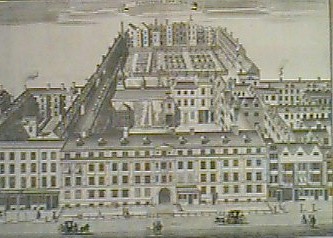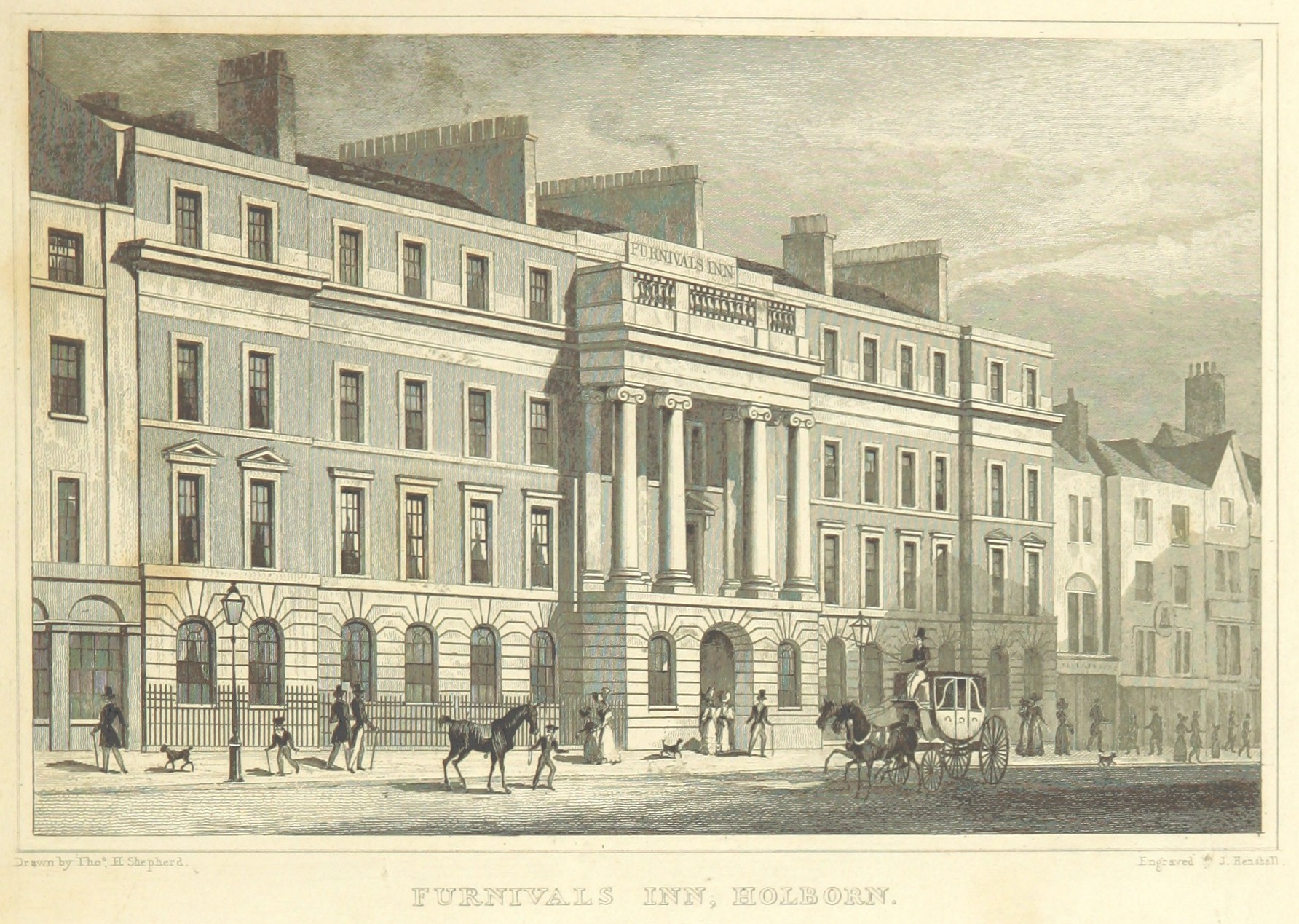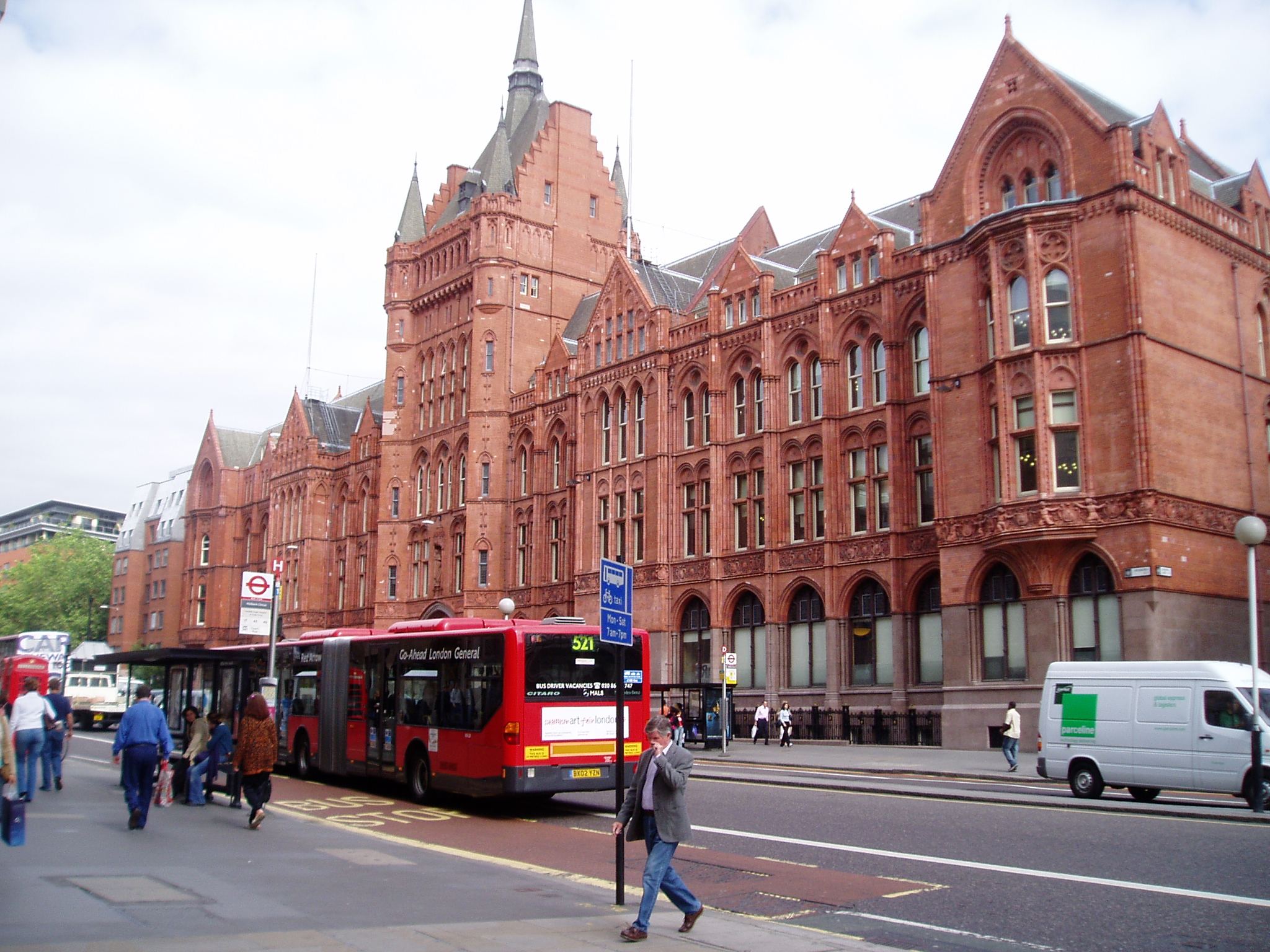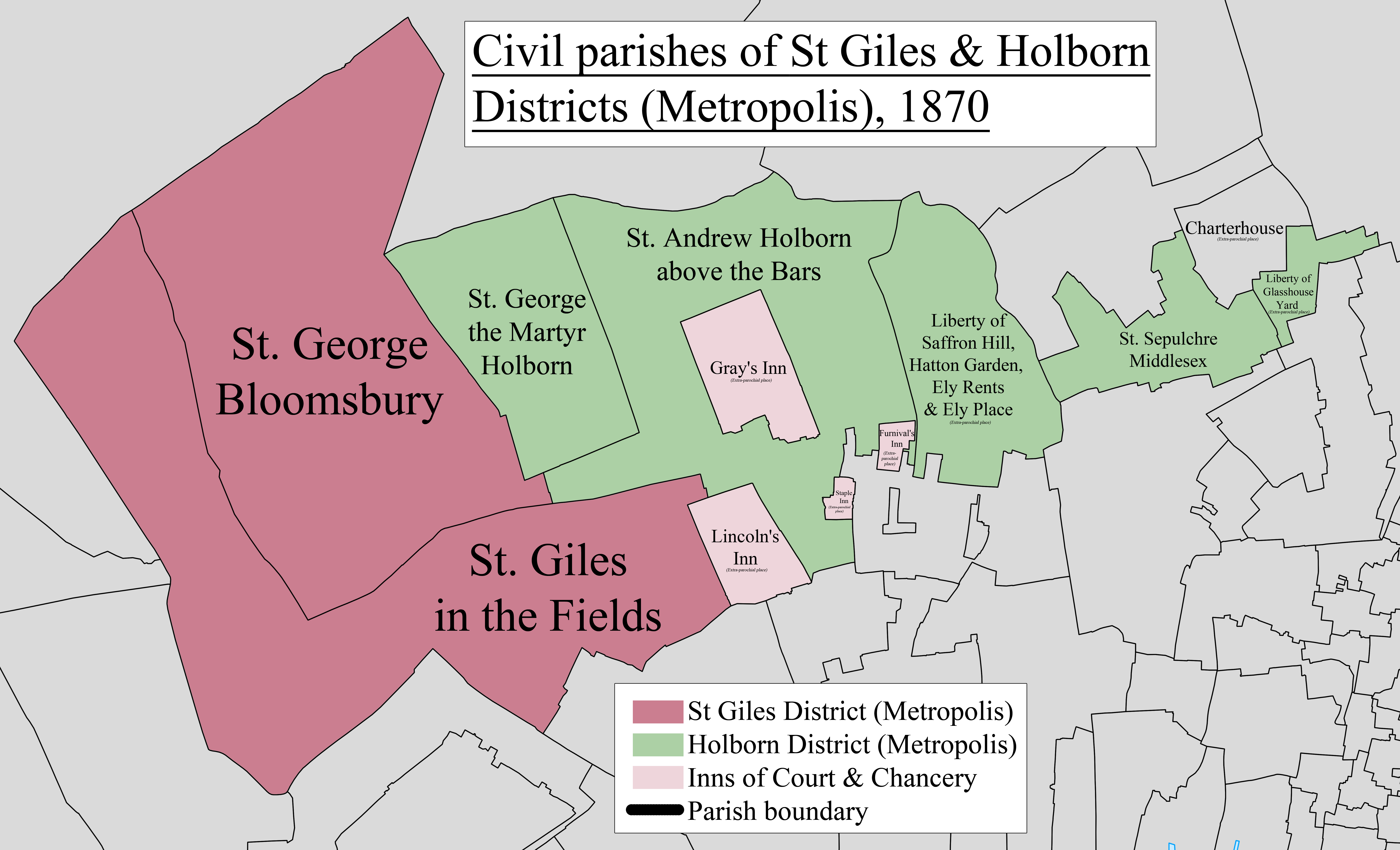Furnival's Inn on:
[Wikipedia]
[Google]
[Amazon]

 Furnival's Inn was an Inn of Chancery which formerly stood on the site of the present
Furnival's Inn was an Inn of Chancery which formerly stood on the site of the present
 Furnival's Inn was founded about 1383 when William de Furnival, 4th Lord Furnival leased a boarding facility to Clerks of Chancery, who prepared writs for the king's courts, assisted by apprentices who, as such, received a preliminary legal training.
By the 15th century the Inns of Chancery had become preparatory schools for students wishing to be called to the bar by the Inns of Court. In 1548 it was affiliated to
Furnival's Inn was founded about 1383 when William de Furnival, 4th Lord Furnival leased a boarding facility to Clerks of Chancery, who prepared writs for the king's courts, assisted by apprentices who, as such, received a preliminary legal training.
By the 15th century the Inns of Chancery had become preparatory schools for students wishing to be called to the bar by the Inns of Court. In 1548 it was affiliated to
/ref> The greater part of the old Inn was taken down in Charles I's time, and a new building erected in its stead. Although it survived the
"Dickens in Furnival's Inn", The New York Times'', April 4, 1886
*Contemporary note of the demolition in 1897: http://nq.oxfordjournals.org/cgi/issue_pdf/frontmatter_pdf/s9-II/49.pdf {{coord, 51.5182, -0.1099, type:landmark_region:GB, display=title 1380s establishments in England Former buildings and structures in the City of London Former civil parishes in London Inns of Chancery Buildings and structures demolished in 1818 Demolished buildings and structures in London

 Furnival's Inn was an Inn of Chancery which formerly stood on the site of the present
Furnival's Inn was an Inn of Chancery which formerly stood on the site of the present Holborn Bars
Holborn Bars, also known as the Prudential Assurance Building is a large red terracotta Victorian building on the north side (138–142) of Holborn in Camden at the boundary of the City of London, England. The block is bounded by Holborn to ...
building (the former Prudential Assurance Company
Prudential plc is a British multinational insurance company headquartered in London, England. It was founded in London in May 1848 to provide loans to professional and working people.
Prudential has dual primary listings on the London Stock ...
building) in Holborn
Holborn ( or ) is a district in central London, which covers the south-eastern part of the London Borough of Camden and a part ( St Andrew Holborn Below the Bars) of the Ward of Farringdon Without in the City of London.
The area has its ro ...
, London
London is the capital and List of urban areas in the United Kingdom, largest city of England and the United Kingdom, with a population of just under 9 million. It stands on the River Thames in south-east England at the head of a estuary dow ...
, England.
History
 Furnival's Inn was founded about 1383 when William de Furnival, 4th Lord Furnival leased a boarding facility to Clerks of Chancery, who prepared writs for the king's courts, assisted by apprentices who, as such, received a preliminary legal training.
By the 15th century the Inns of Chancery had become preparatory schools for students wishing to be called to the bar by the Inns of Court. In 1548 it was affiliated to
Furnival's Inn was founded about 1383 when William de Furnival, 4th Lord Furnival leased a boarding facility to Clerks of Chancery, who prepared writs for the king's courts, assisted by apprentices who, as such, received a preliminary legal training.
By the 15th century the Inns of Chancery had become preparatory schools for students wishing to be called to the bar by the Inns of Court. In 1548 it was affiliated to Lincoln's Inn
The Honourable Society of Lincoln's Inn is one of the four Inns of Court in London to which barristers of England and Wales belong and where they are called to the Bar. (The other three are Middle Temple, Inner Temple and Gray's Inn.) Lincol ...
through a long-term lease. Sir Thomas More
Sir Thomas More (7 February 1478 – 6 July 1535), venerated in the Catholic Church as Saint Thomas More, was an English lawyer, judge, social philosopher, author, statesman, and noted Renaissance humanist. He also served Henry VIII as Lor ...
was Reader at the Inn from 1504 to 1507.
By the seventeenth century, the Inns of Chancery began to turn into societies for attorneys and solicitors; they became residences, offices and dining clubs.Parker, David. "Dickens, the Inns of Court, and the Inns of Chancery", ''The Literary London Journal'', March 2010/ref> The greater part of the old Inn was taken down in Charles I's time, and a new building erected in its stead. Although it survived the
Great Fire of London
The Great Fire of London was a major conflagration that swept through central London from Sunday 2 September to Thursday 6 September 1666, gutting the medieval City of London inside the old Roman city wall, while also extending past th ...
, the Inn, together with the other Inns of Chancery, ceased to exist in the 19th century. According to the ''Gentleman's Magazine'' of June 1818, "'Furnival's Inn Cellar' was a place well known to the professional gentlemen, where a good dinner may be had at a reasonable price." The Inn was dissolved as a society in 1817 when Lincoln's Inn did not renew its lease and the medieval building was demolished in 1818. The building was rebuilt as apartments by a new owner who retained the old name.

Charles Dickens
Charles John Huffam Dickens (; 7 February 1812 – 9 June 1870) was an English writer and social critic. He created some of the world's best-known fictional characters and is regarded by many as the greatest novelist of the Victorian er ...
rented rooms here between December 1834 and throughout the first year of his marriage, until 1837. He began the '' Pickwick Papers'' while a tenant there. The character John Westlock in ''Martin Chuzzlewit'' lives in Furnival's Inn, and describes it as "...a shady, quiet place, echoing to the footsteps of the stragglers who have business there; and rather monotonous and gloomy on summer evenings. ... there are snug chambers in those Inns where the bachelors live, and, for the desolate fellows they pretend to be, it is quite surprising how well they get on".
J.M. Barrie
Sir James Matthew Barrie, 1st Baronet, (; 9 May 1860 19 June 1937) was a Scottish novelist and playwright, best remembered as the creator of Peter Pan. He was born and educated in Scotland and then moved to London, where he wrote several succe ...
lived in a set of chambers at No. 7 Furnival's Inn from 1888 to 1889.Denis Mackail, ''The Story of J.M.B.'' (Peter Davies, 1941) The site was redeveloped again, in 1879, as the headquarters of the Prudential Assurance. A plaque marks the site where Furnival's Inn stood.
Governance
Furnival's Inn was an area for local government partly in theCity of London
The City of London is a city, ceremonial county and local government district that contains the historic centre and constitutes, alongside Canary Wharf, the primary central business district (CBD) of London. It constituted most of London f ...
and partly in Middlesex
Middlesex (; abbreviation: Middx) is a historic county in southeast England. Its area is almost entirely within the wider urbanised area of London and mostly within the ceremonial county of Greater London, with small sections in neighbour ...
. It was an extra-parochial area
In England and Wales, an extra-parochial area, extra-parochial place or extra-parochial district was a geographically defined area considered to be outside any ecclesiastical or civil parish. Anomalies in the parochial system meant they had no ch ...
and became a civil parish
In England, a civil parish is a type of administrative parish used for local government. It is a territorial designation which is the lowest tier of local government below districts and counties, or their combined form, the unitary authorit ...
in 1858 within the Holborn Poor Law Union. The part within the City of London was transferred to St Andrew Holborn
__NOTOC__
St Andrew Holborn was an ancient English parish that until 1767 was partly in the City of London and mainly in the county of Middlesex. Its City, thus southern, part retained its former name or was sometimes officially referred to as ...
in 1900. The remaining parish was part of the Metropolitan Borough of Holborn from 1900 and was abolished as a civil parish in 1930. It was unpopulated after the construction of Holborn Bars.
See also
* List of demolished buildings and structures in LondonReferences
Sources
*D. S. Bland, ''Early records of Furnival's Inn'', 1957.External links
"Dickens in Furnival's Inn", The New York Times'', April 4, 1886
*Contemporary note of the demolition in 1897: http://nq.oxfordjournals.org/cgi/issue_pdf/frontmatter_pdf/s9-II/49.pdf {{coord, 51.5182, -0.1099, type:landmark_region:GB, display=title 1380s establishments in England Former buildings and structures in the City of London Former civil parishes in London Inns of Chancery Buildings and structures demolished in 1818 Demolished buildings and structures in London